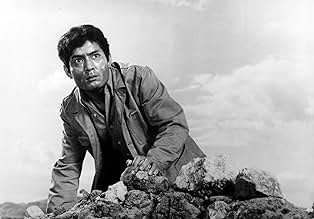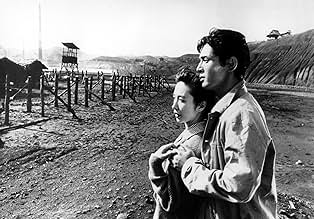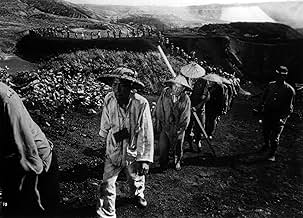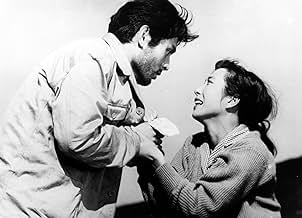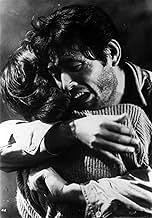La Condition de l'homme 1 - Il n'y a pas de plus grand amour
Original title: Ningen no jôken
IMDb RATING
8.5/10
10K
YOUR RATING
A Japanese pacifist, unable to face the dire consequences of conscientious objection, is transformed by his attempts to compromise with the demands of war-time Japan.A Japanese pacifist, unable to face the dire consequences of conscientious objection, is transformed by his attempts to compromise with the demands of war-time Japan.A Japanese pacifist, unable to face the dire consequences of conscientious objection, is transformed by his attempts to compromise with the demands of war-time Japan.
- Director
- Writers
- Stars
- Awards
- 5 wins & 1 nomination total
Kôji Nanbara
- Kô
- (as Shinji Nanbara)
- Director
- Writers
- All cast & crew
- Production, box office & more at IMDbPro
Featured reviews
7KFL
This film was hugely popular when it came out around 1960, reflecting the fiercely anti-war sentiment of the Japanese at the time. I have read that for a time when it came out, all three parts of The Human Condition (totaling nine and one-half hours) were shown in a single sitting at theaters in northern Tokyo, starting around 10 pm and ending in time for people to catch the trains home the next morning.
While it is a powerful film which portrays much of the suffering and brutality visited on the Chinese in Manchuria by the Japanese war machine, it is not without some rather unlikely plot twists. In particular, Kaji seems somewhat too saint-like to be believable.
It is worth mentioning that the title "The Human Condition" is perhaps misleading. The Japanese word "jouken" corresponding to "condition" is not normally used in a descriptive sense, but rather, as a condition to be fulfilled or satisfied. Thus the title might be better rendered "The Conditions for Being Human"--the implication being that in wartime, the conditions for remaining fully human are elusive at best.
While it is a powerful film which portrays much of the suffering and brutality visited on the Chinese in Manchuria by the Japanese war machine, it is not without some rather unlikely plot twists. In particular, Kaji seems somewhat too saint-like to be believable.
It is worth mentioning that the title "The Human Condition" is perhaps misleading. The Japanese word "jouken" corresponding to "condition" is not normally used in a descriptive sense, but rather, as a condition to be fulfilled or satisfied. Thus the title might be better rendered "The Conditions for Being Human"--the implication being that in wartime, the conditions for remaining fully human are elusive at best.
This is an excellent film about one man attempting to change the system. Kaji brings his youthful enthusiasm, idealism, and humanism against a cruel, unjust machine. The acting, direction, and cinematography are all world class. This is a gripping film which will leave you yearning for part two. This is just the start of a stunning epic.
The greatest film ever made! And I've seen many, many films. This even supercedes The Seven Samurai which I consider a masterwork. The Human Condition is 10 hours and in 3 movies. A stunning performance by Tatsuya Nakadai. Find the 3 parts, hie yourself off to a monastery and watch them, with a bit of a breather between each movie. Stroheim's Greed was about 10 hours before the Hollywood hacks cut it back. This one is intact. It is subtitled and not dubbed.
An interesting film that portrays the struggles of an idealistic young Japanese man who is challenged to employ his idealism in the service of the Japanese war effort in WW II. A key aspect of this struggle is the protagonist's struggle within himself. Kaji, the young man, seeks to humanize the brutal conditions at a mining operation in Manchuria. Further complicating matters is the profound sense of national prejudice that shapes the relationships between the various characters. To the workers & Chinese prisoners, regardless of his professed ideals, Kaji is Japanese and therefore an oppressor. Although Kaji tries to win their trust, his own frustration enables him to strike a young Chinese helper, reinforcing the image of the brutal Japanese. This weakness is a key underlying theme. Even late in the film, when he takes a very brave stand against some executions, his effort is a bit late and his stand is successful only when the Chinese prisoners take up the protest. He struggles because her fears he cannot live up to the ideals he expresses.
Kaji is also confronted with the another irony. Although he opposes the war, he has chosen a route of avoidance rather than resistance. This is emphasized early in the film during an evening with a friend who is about to be inducted. His friend comments that, although they opposed the war, neither of them was brave enough to face the penalty for resistance of life imprisonment. Shortly thereafter, he takes the mine job to get a military exemption. Yet, if he is successful, the production improvements in the mine only fuel the Japanese war machine.
A valuable film because it explores areas of the pacific war that are not well know in the west. Also an interesting observation in the danger of half-measures when taking a moral stance. Kaji is ultimately confronted with the fact that you cannot avoid the war, only oppose it or aid it. I look forward to viewing the next film.
Kaji is also confronted with the another irony. Although he opposes the war, he has chosen a route of avoidance rather than resistance. This is emphasized early in the film during an evening with a friend who is about to be inducted. His friend comments that, although they opposed the war, neither of them was brave enough to face the penalty for resistance of life imprisonment. Shortly thereafter, he takes the mine job to get a military exemption. Yet, if he is successful, the production improvements in the mine only fuel the Japanese war machine.
A valuable film because it explores areas of the pacific war that are not well know in the west. Also an interesting observation in the danger of half-measures when taking a moral stance. Kaji is ultimately confronted with the fact that you cannot avoid the war, only oppose it or aid it. I look forward to viewing the next film.
Masaki Kobayashi's dream project was the Human Condition adaptation, and he pulled it off as a brilliantly told and filmed epic that tells of a man trying to cling to his humanity in inhuman circumstances. All three films have wonders in various supporting performances and set-pieces that astound with their moments of poetic realism, and the sum of it all makes Lord of the Rings look like kid's stuff. In the case of the first feature on the trilogy, No Greater Love, we're introduced to and see the young, idealistic and essentially good-hearted Kaji (Tatsuya Nakadai) as he gets a job as a labor supervisor at a POW camp in Manchuria following an impressive paper presentation. He wants to do his best, but the 'powers-that-be', which include the stalwart boss and particularly the fascistic Kempeitai (army personnel on site), keep things always on edge with tension, and as new Chinese POW's roll in and he finds himself torn: how to keep production up of the ore while also not becoming a monster just like the other "Japanese devils" to the POW's.
While the story has an immediate appeal (or rather connection-to) the Japanese public as a piece of modern history- the occupation/decimation of Manchuria and its people- none of its dramatic or emotional power is lost on me. Kobayashi is personally tied to the material very much (he himself fought in the war and immediately bought the rights to the 6-volume series when first released), but he doesn't ever get in the way of the story. Matter of fact, he's a truly amazing storyteller first and foremost; dazzlingly he interweaves the conflicts of the prisoners (i.e. Chen, the prostitutes, Kao) with Kaji's first big hurdle of conscience at the labor camp as he sees prisoners treated in horrible conditions, beaten, abused, and eventually brought to senseless deaths thanks to Furyua and his ilk, and finds himself brought to an ultimate question: can he be a human being, as opposed to another mindless monster?
Kobayashi creates scenes and moments that are in the grand and epic tradition of movies, sometimes in beautiful effect and other times showing for the sake of the horrors of wartime (for example, there will never be as harrowing an exodus from a half-dozen cattle cars as seen when the Chinese POW's exit from there to the food sacks), and is able with his wonderful DP to make intimately acted scenes in the midst of wide scapes like the outside ore mines and the cramped living quarters or caves. And damn it all if we don't get one of the great scenes in the history of movies, which is when the six "escapees" are put to execution with the prisoners, and horrified Kaji, watching in stark, gruesome detail. Everything about that one scene is just about perfect.
But as the anchor of the piece (and unlike the other two films, he's not even in every scene of this part), Tatsuya Nakadai delivers on his breakthrough performance. Kobayashi needed a bridge between pre and post-war Japan, and Nakadai is that kind of presence. But aside from being an appealing star- the kind you don't want to avert your eyes from- he's mind-blowingly talented be it in subtle bits of business or when he has to go to town in explosive emotional scenes (or, also, just a twitch under his eye in a super-tense exchange). This goes without saying other actors right alongside him- Aratama, Yamamura, Manbara- are perfectly cast as supervisor, prisoner, prostitute, wife alike to Kaji. And yet, for all the praise worth giving to the film, one that gets even better in its second half than its first, this is only the first part!
While the story has an immediate appeal (or rather connection-to) the Japanese public as a piece of modern history- the occupation/decimation of Manchuria and its people- none of its dramatic or emotional power is lost on me. Kobayashi is personally tied to the material very much (he himself fought in the war and immediately bought the rights to the 6-volume series when first released), but he doesn't ever get in the way of the story. Matter of fact, he's a truly amazing storyteller first and foremost; dazzlingly he interweaves the conflicts of the prisoners (i.e. Chen, the prostitutes, Kao) with Kaji's first big hurdle of conscience at the labor camp as he sees prisoners treated in horrible conditions, beaten, abused, and eventually brought to senseless deaths thanks to Furyua and his ilk, and finds himself brought to an ultimate question: can he be a human being, as opposed to another mindless monster?
Kobayashi creates scenes and moments that are in the grand and epic tradition of movies, sometimes in beautiful effect and other times showing for the sake of the horrors of wartime (for example, there will never be as harrowing an exodus from a half-dozen cattle cars as seen when the Chinese POW's exit from there to the food sacks), and is able with his wonderful DP to make intimately acted scenes in the midst of wide scapes like the outside ore mines and the cramped living quarters or caves. And damn it all if we don't get one of the great scenes in the history of movies, which is when the six "escapees" are put to execution with the prisoners, and horrified Kaji, watching in stark, gruesome detail. Everything about that one scene is just about perfect.
But as the anchor of the piece (and unlike the other two films, he's not even in every scene of this part), Tatsuya Nakadai delivers on his breakthrough performance. Kobayashi needed a bridge between pre and post-war Japan, and Nakadai is that kind of presence. But aside from being an appealing star- the kind you don't want to avert your eyes from- he's mind-blowingly talented be it in subtle bits of business or when he has to go to town in explosive emotional scenes (or, also, just a twitch under his eye in a super-tense exchange). This goes without saying other actors right alongside him- Aratama, Yamamura, Manbara- are perfectly cast as supervisor, prisoner, prostitute, wife alike to Kaji. And yet, for all the praise worth giving to the film, one that gets even better in its second half than its first, this is only the first part!
Did you know
- TriviaAccording to Tatsuya Nakadai, a marathon screening of the entire nine-and-a-half-hour "Human Condition" trilogy is held once a year in Japan, and he has once or twice attended these screenings, which are always sold out.
- GoofsAt one point a Japanese guard begins to whip Kao, yet the motions he makes are just a flailing of his arms, visibly missing the actor. Kao retaliates by throwing a rock at the guard, but the rock never strikes the guard. However, the actor playing the guard overreacts as if he has been struck.
- Quotes
Kuroki Shochô: You know, Kaji, theory may be correct and yet not always apply to reality.
Kaji: Then either the theory is wrong or it was incorrectly applied.
- ConnectionsFollowed by La Condition de l'homme 2 - Le Chemin de l'éternité (1959)
- How long is The Human Condition I: No Greater Love?Powered by Alexa
Details
- Release date
- Country of origin
- Languages
- Also known as
- The Human Condition I: No Greater Love
- Filming locations
- Hokkaido, Japan(Exterior scenes of the Manchurian mine)
- Production companies
- See more company credits at IMDbPro
- Runtime3 hours 28 minutes
- Color
- Sound mix
- Aspect ratio
- 2.35 : 1
Contribute to this page
Suggest an edit or add missing content

Top Gap
By what name was La Condition de l'homme 1 - Il n'y a pas de plus grand amour (1959) officially released in India in English?
Answer

